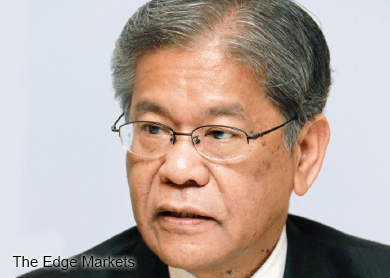

KUALA LUMPUR: The terms of the concession agreement for the operation of the controversial automated enforcement system (AES), which is aimed at tracking traffic offences, could see some changes once negotiations between Boustead Holdings Bhd and the government are finalised by the end of this month.
“We are finalising the agreement with the government to see whether we can play a role in terms of ensuring that this project (AES) can be undertaken on the basis that we will supply the system including the cameras,” Boustead deputy chairman and group managing director Tan Sri Lodin Wok Kamaruddin told a press conference after the group’s annual general meeting yesterday.
“We will play a role in terms of helping to educate the public and motorists on how to observe traffic rules and regulations,” he said.
Boustead (fundamental: 0.65; valuation: 2.0) is in the midst of acquiring a 50% stake in Irat Properties Sdn Bhd, which has just entered into an agreement to purchase two private companies that are currently AES concession holders — ATES Sdn Bhd and Beta Tegap Sdn Bhd.
Boustead’s parent, Lembaga Tabung Angkatan Tentera, in which Lodin is a board member appointed by the government, holds a 49.17% equity interest in Irat.
The conglomerate is paying RM127.8 million cash for the equity interest in Irat, but Lodin declined to reveal the price Irat is paying to take over ATES and Beta Tegap.
He assured shareholders that Boustead had paid a “fair price” for the acquisition of the concessions.
While the revised terms of the concessions are still being discussed, Lodin revealed that Boustead’s role will mostly be confined to installing the AES cameras and its operating system as well as maintaining and repairing them.
Meanwhile, the issuing and collecting of summonses would be left to the government.
Further, Boustead is looking to have the current concession period of a maximum of five years stretched to “anything between 12 and 15 years” so that the group is able to “get back its investment and some decent returns”.
“We will not do it unless we see the return from investment would justify the money that we are going to put in. We are expecting a decent 18% to 20% return [on our investment],” Lodin said.
Once the negotiations with the government are finalised, Lodin said Boustead would be installing and operating up to 500 AES cameras nationwide.
So far, 14 cameras have been installed under the current concessions, pending a full rollout of camera installation throughout the country.
Under the current five-year concession terms, ATES and Beta Tegap are supposed to operate and maintain the AES equipment and eventually hand them over to the Road Transport Department at the end of the concessions.
The rate of return for both the companies was capped at 17% and to be remunerated based on a three-tier structure. Under the first tier, both companies would be entitled to RM16 per valid summons up to five million summonses.
After reaching more than five million summonses, tier two would kick in, with the additional revenue to be split evenly between the two companies and the government up to a cap of RM270 million each.
After hitting the RM270 million cap, tier three would kick in with the companies each receiving 7.5% from the remaining revenue and the government the rest. Both companies would only be paid if motorists settle their summonses.
Lodin hinted that the current payment structure could also change, suggesting that Boustead could get a lower share of the summonses once the deal is finalised.
In the meantime, both ATES and Beta Tegap have been embroiled in a lengthy arbitration with the government after Putrajaya abruptly took over the AES operations from the private operators.
Lodin said there “won’t be any more arbitration” once Boustead’s negotiations with the government conclude as all parties are looking at a settlement.
The Edge Financial Daily previously reported on Feb 4, 2015, that the government could be paying up to RM1 billion in settlement to the concession holders for the arbitration.
Meanwhile, Boustead said it is expecting a better year after a “challenging” 2014, which saw a slump in Brent crude oil and commodity prices.
Lodin expects the group’s pharmaceutical arm Pharmaniaga Bhd to remain as its “star performer” as it aims to expand both its concession and non-concession businesses. Pharmaniaga is targeting to open 10 more of its own pharmacies in 2015 and expand into Southeast Asia and the Middle East.
Boustead will also be reassessing its non-core and non-profitable businesses such as its building materials division, with a view to terminating them to become more cost-efficient and effective.
The Edge Research’s fundamental score reflects a company’s profitability and balance sheet strength, calculated based on historical numbers. The valuation score determines if a stock is attractively valued or not, also based on historical numbers. A score of 3 suggests strong fundamentals and attractive valuations. Go to www.theedgemarkets.com for more details on a company’s financial dashboard.
This article first appeared in The Edge Financial Daily, on April 7, 2015.